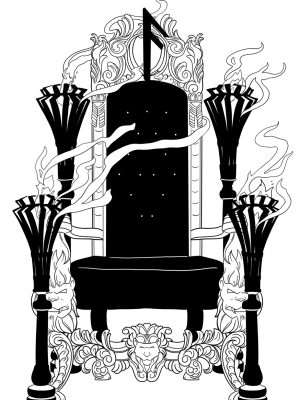A note on setting from your Runeheim Staff
The term ‘unreliable narrator’ is a literary device that specifically draws a distinction between a narrator who presents a story that is untrue outside the narrative context, and a narrator whose story is untrue within the realities of the fictional world in which they operate.
What does this have to do with Runeheim? Gothic: the Lion Age has always been a setting teeming with conflict; a place for players to explore moral quandaries and to be heros in the face of darkness, injustice and horror. As players, you will be participating in a developing history; dropping into a timeline that has been developing within and outside the playable theaters of this imagined world. Through in-game actions players are making history, but they are also living with the history of the world and as we know from our real life experience: History is written by the victors.
As the name suggests, the Gothic Throne is the undisputed victor of this history- so far. This means that the world truths presented to you will be those of your historically biased and subjective narrator. We encourage you to explore this world, to question your narrator and to discern your truth.
Within the Runeheim theater it will be especially important to be aware of the unreliable narrator as we explore controversial themes; religious oppression, colonialism, sexism, racism, war, desperation in survival and slavery, to name a few . Historically speaking, these dark themes play an important part in shaping a dynamic world and ‘Successful’ implementation of these themes depend on people accepting the rhetoric of those in positions of power. These rhetorics depend on the dehumanization, minimization and eventual erasure of the culture, traditions, language, history and values of those without power . You will be exposed to these themes in play, and we want to be clear that we are setting a stage in which players will explore a darker narrative. The rhetoric of Runeheim’s unreliable narrator does not represent the beliefs of our staff. Any play that involves the aforementioned themes is intended to be grounds for moral and ethical exploration- not staff condoning or glorifying the injustices committed by people in power- fictional or historical.
Does this mean every ‘Truth’ signaled by plot is a lie?
Short answer, No. While many features of the Gothic universe are pure fantasy, we strive to create multidimensional characters with realistic human complexities. While the universe contains forces of good and evil, there are no factions who are ‘the good guys’ and factions who are the ‘bad guys’. Your character’s place on the spectrum of good and evil will be marked by your choices, not your character’s affiliations. Finding the truth will not be as simple as choosing to believe the opinion of a single side. Truth must be sought and disentangled from the web of narratives presented. It is our sincere hope you enjoy the search.
What if I don’t want to engage with these darker themes in my role play?
Runeheim is Njordic land occupied by Gothic forces. Having role play that does not engage with this dark narrative AT ALL would be extremely challenging in this setting. That being said, staff will NEVER push you to engage in role play you do not consent to. If you would like to avoid any of the aforementioned themes in your personal plot, we would be happy to work with you during character creation to minimize your personal engagement with this portion of our narrative. As is true with all scenes, if a plot or scene evolves into something you do not want to engage with, we encourage you to use the ‘fade to black’ mechanic as a means of resolving the situation without having to engage in the role play. We value your safety, and ask that you act as your own best advocate in communicating your boundaries during game play.
